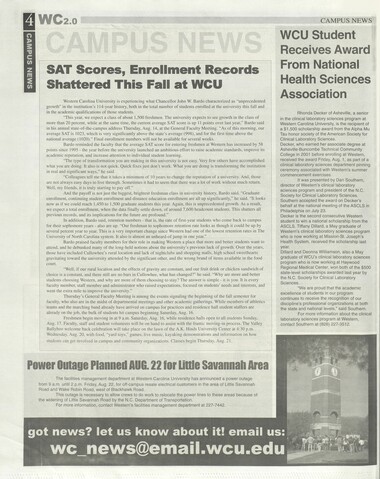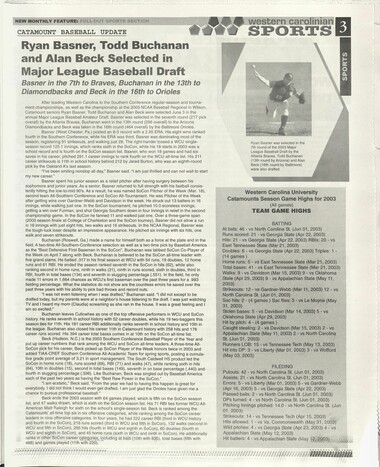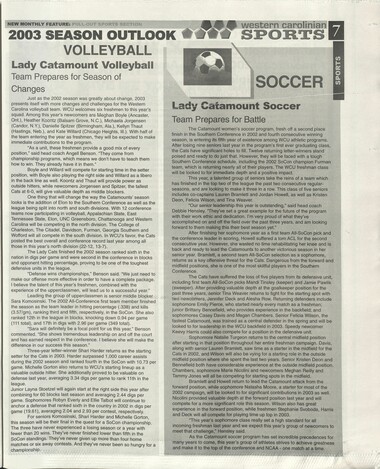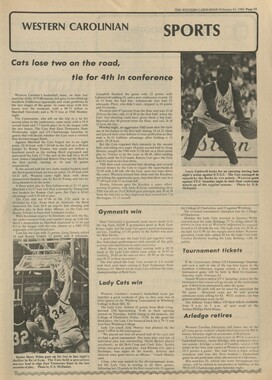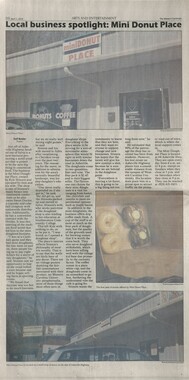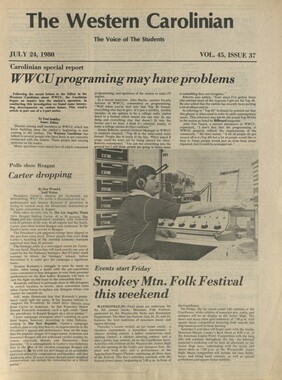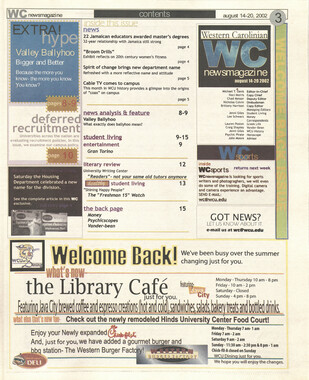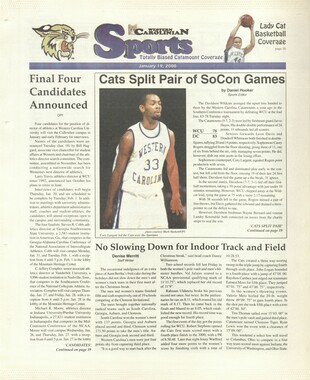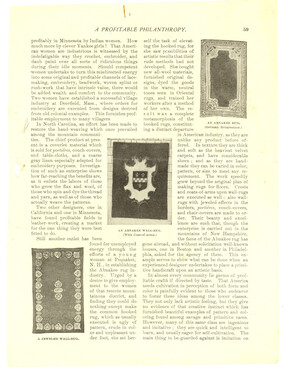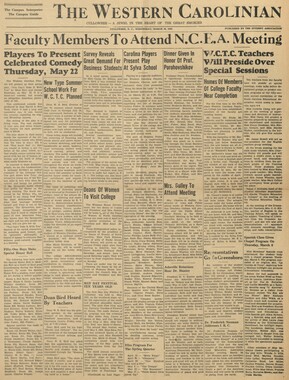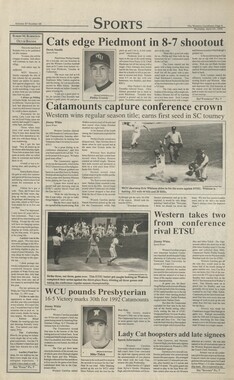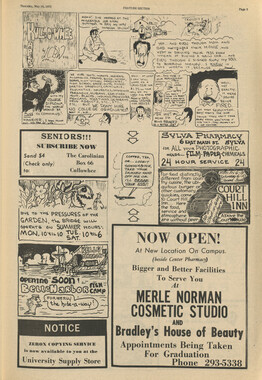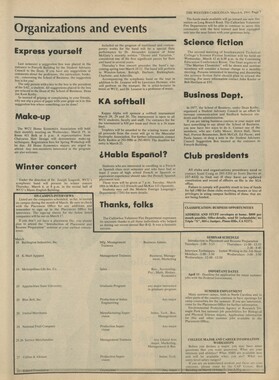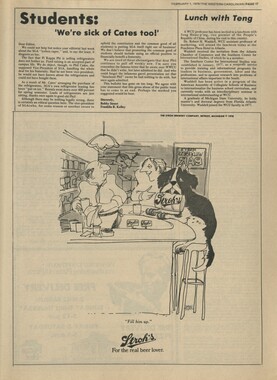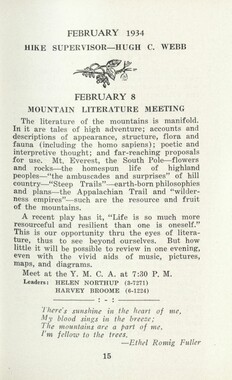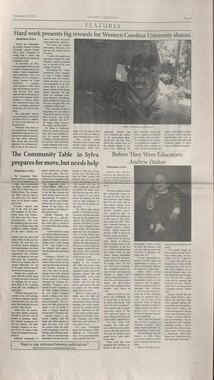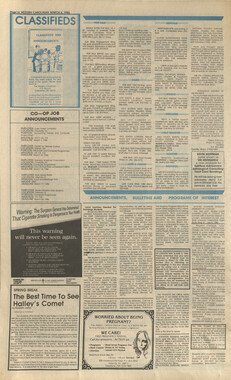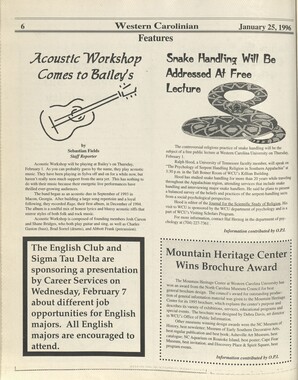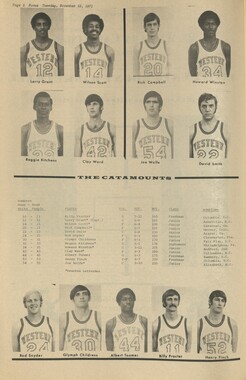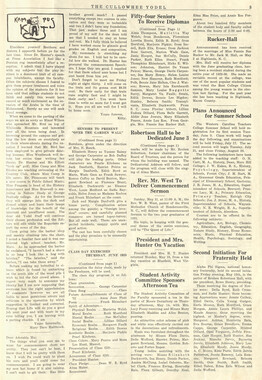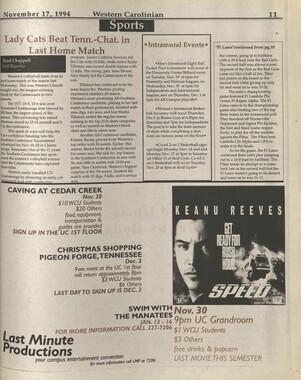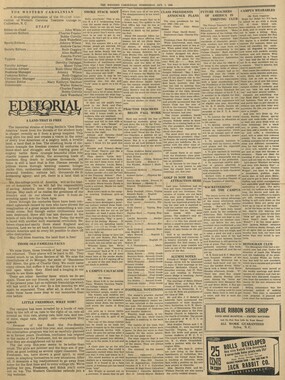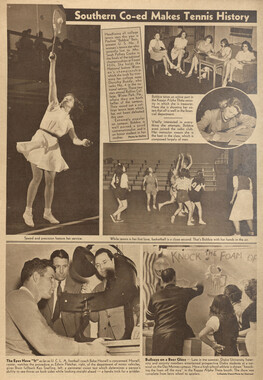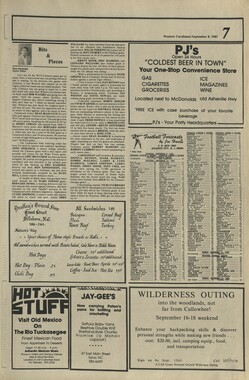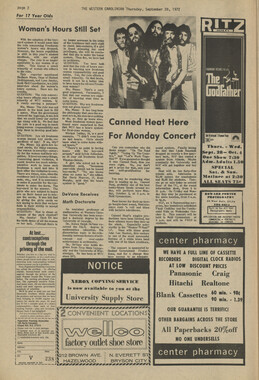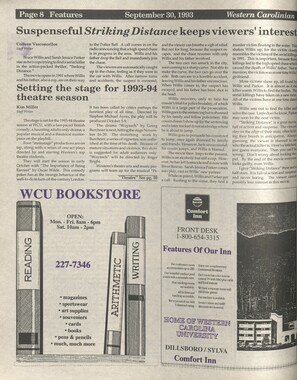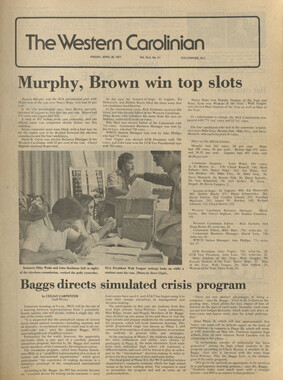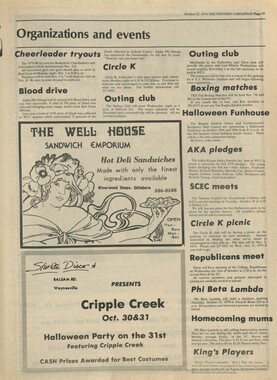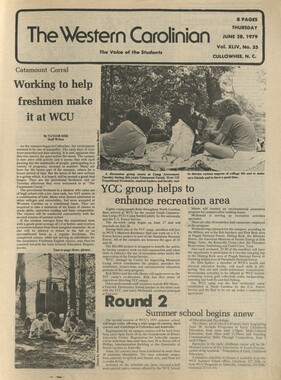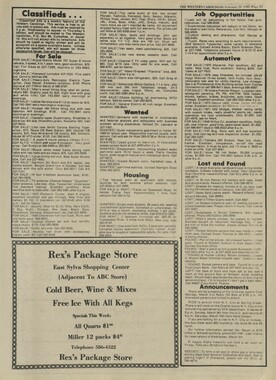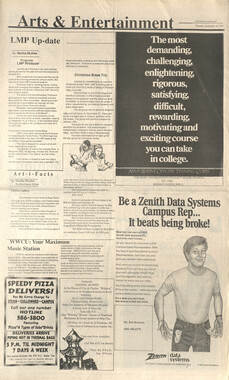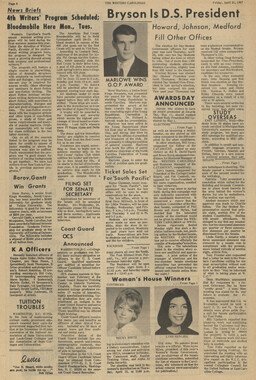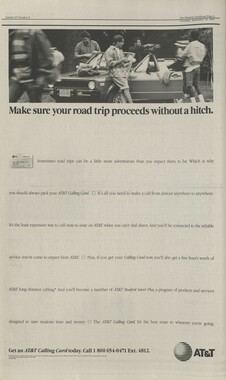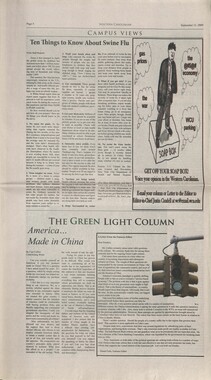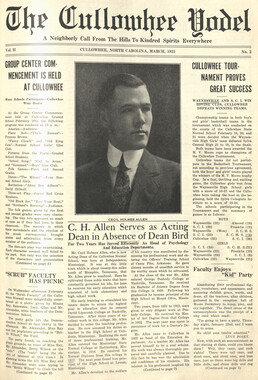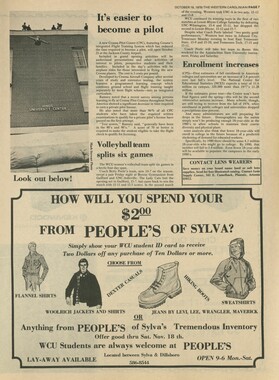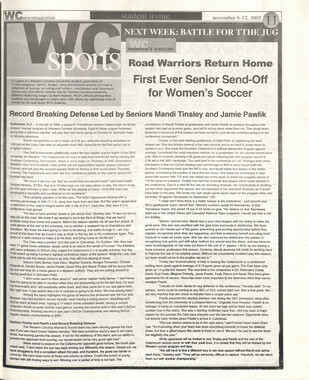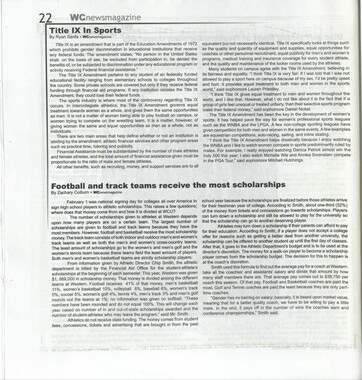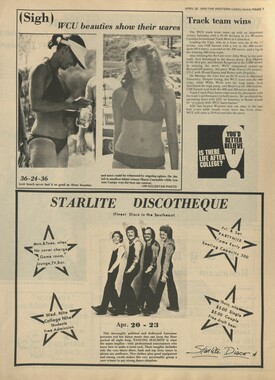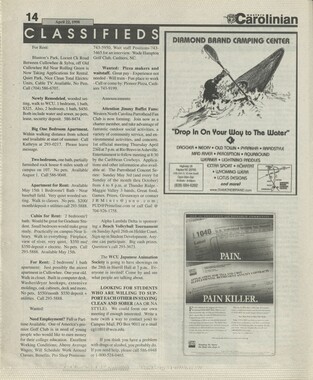Western Carolina University (21)
View all
- Canton Champion Fibre Company (2308)
- Cherokee Traditions (291)
- Civil War in Southern Appalachia (165)
- Craft Revival (1942)
- George Masa Collection (137)
- Great Smoky Mountains - A Park for America (3080)
- Highlights from Western Carolina University (422)
- Horace Kephart (973)
- Journeys Through Jackson (159)
- LGBTQIA+ Archive of Jackson County (89)
- Oral Histories of Western North Carolina (318)
- Picturing Appalachia (6617)
- Stories of Mountain Folk (413)
- Travel Western North Carolina (153)
- Western Carolina University Fine Art Museum Vitreograph Collection (129)
- Western Carolina University Herbarium (92)
- Western Carolina University: Making Memories (738)
- Western Carolina University Publications (2491)
- Western Carolina University Restricted Electronic Theses and Dissertations (146)
- Western North Carolina Regional Maps (71)
- World War II in Southern Appalachia (131)
University of North Carolina Asheville (6)
View all
- Allanstand Cottage Industries (62)
- Appalachian National Park Association (53)
- Bennett, Kelly, 1890-1974 (1463)
- Berry, Walter (76)
- Brasstown Carvers (40)
- Carver, George Washington, 1864?-1943 (26)
- Cathey, Joseph, 1803-1874 (1)
- Champion Fibre Company (233)
- Champion Paper and Fibre Company (297)
- Cherokee Indian Fair Association (16)
- Cherokee Language Program (22)
- Crowe, Amanda (40)
- Edmonston, Thomas Benton, 1842-1907 (7)
- Ensley, A. L. (Abraham Lincoln), 1865-1948 (275)
- Fromer, Irving Rhodes, 1913-1994 (70)
- George Butz (BFS 1907) (46)
- Goodrich, Frances Louisa (120)
- Grant, George Alexander, 1891-1964 (96)
- Heard, Marian Gladys (60)
- Kephart, Calvin, 1883-1969 (15)
- Kephart, Horace, 1862-1931 (313)
- Kephart, Laura, 1862-1954 (67)
- Laney, Gideon Thomas, 1889-1976 (439)
- Masa, George, 1881-1933 (61)
- McElhinney, William Julian, 1896-1953 (44)
- Niggli, Josephina, 1910-1983 (10)
- North Carolina Park Commission (105)
- Osborne, Kezia Stradley (9)
- Owens, Samuel Robert, 1918-1995 (11)
- Penland Weavers and Potters (36)
- Roberts, Vivienne (15)
- Roth, Albert, 1890-1974 (142)
- Schenck, Carl Alwin, 1868-1955 (1)
- Sherrill's Photography Studio (2565)
- Southern Highland Handicraft Guild (127)
- Southern Highlanders, Inc. (71)
- Stalcup, Jesse Bryson (46)
- Stearns, I. K. (213)
- Thompson, James Edward, 1880-1976 (226)
- United States. Indian Arts and Crafts Board (130)
- USFS (683)
- Vance, Zebulon Baird, 1830-1894 (1)
- Weaver, Zebulon, 1872-1948 (58)
- Western Carolina College (230)
- Western Carolina Teachers College (282)
- Western Carolina University (2008)
- Western Carolina University. Mountain Heritage Center (18)
- Whitman, Walt, 1819-1892 (10)
- Wilburn, Hiram Coleman, 1880-1967 (73)
- Williams, Isadora (3)
- Cain, Doreyl Ammons (0)
- Crittenden, Lorraine (0)
- Rhodes, Judy (0)
- Smith, Edward Clark (0)
- Appalachian Region, Southern (3032)
- Asheville (N.C.) (1945)
- Avery County (N.C.) (26)
- Blount County (Tenn.) (195)
- Buncombe County (N.C.) (1680)
- Cherokee County (N.C.) (283)
- Clay County (N.C.) (556)
- Graham County (N.C.) (238)
- Great Smoky Mountains National Park (N.C. and Tenn.) (525)
- Haywood County (N.C.) (3573)
- Henderson County (N.C.) (70)
- Jackson County (N.C.) (4925)
- Knox County (Tenn.) (35)
- Knoxville (Tenn.) (13)
- Lake Santeetlah (N.C.) (10)
- Macon County (N.C.) (421)
- Madison County (N.C.) (216)
- McDowell County (N.C.) (39)
- Mitchell County (N.C.) (135)
- Polk County (N.C.) (35)
- Qualla Boundary (982)
- Rutherford County (N.C.) (78)
- Swain County (N.C.) (2185)
- Transylvania County (N.C.) (270)
- Watauga County (N.C.) (12)
- Waynesville (N.C.) (86)
- Yancey County (N.C.) (72)
- Aerial Photographs (3)
- Aerial Views (60)
- Albums (books) (4)
- Articles (1)
- Artifacts (object Genre) (228)
- Bibliographies (1)
- Biography (general Genre) (2)
- Cards (information Artifacts) (38)
- Clippings (information Artifacts) (192)
- Copybooks (instructional Materials) (3)
- Crafts (art Genres) (622)
- Depictions (visual Works) (21)
- Design Drawings (1)
- Digital Moving Image Formats (2)
- Drawings (visual Works) (185)
- Envelopes (101)
- Exhibitions (events) (1)
- Facsimiles (reproductions) (1)
- Fiction (general Genre) (4)
- Financial Records (12)
- Fliers (printed Matter) (67)
- Glass Plate Negatives (381)
- Guidebooks (2)
- Internegatives (10)
- Interviews (823)
- Land Surveys (102)
- Letters (correspondence) (1045)
- Manuscripts (documents) (618)
- Maps (documents) (177)
- Memorandums (25)
- Minutes (administrative Records) (59)
- Negatives (photographs) (6090)
- Newsletters (1290)
- Newspapers (2)
- Notebooks (8)
- Occupation Currency (1)
- Paintings (visual Works) (1)
- Pen And Ink Drawings (1)
- Periodicals (194)
- Personal Narratives (10)
- Photographs (12977)
- Plans (maps) (1)
- Poetry (6)
- Portraits (4568)
- Postcards (329)
- Programs (documents) (181)
- Publications (documents) (2444)
- Questionnaires (65)
- Relief Prints (26)
- Sayings (literary Genre) (1)
- Scrapbooks (282)
- Sheet Music (2)
- Slides (photographs) (402)
- Songs (musical Compositions) (2)
- Sound Recordings (802)
- Specimens (92)
- Speeches (documents) (18)
- Tintypes (photographs) (8)
- Transcripts (329)
- Text Messages (0)
- A.L. Ensley Collection (275)
- Appalachian Industrial School Records (7)
- Appalachian National Park Association Records (336)
- Axley-Meroney Collection (2)
- Bayard Wootten Photograph Collection (20)
- Bethel Rural Community Organization Collection (7)
- Blumer Collection (5)
- C.W. Slagle Collection (20)
- Canton Area Historical Museum (2110)
- Carlos C. Campbell Collection (462)
- Cataloochee History Project (64)
- Cherokee Studies Collection (4)
- Daisy Dame Photograph Album (5)
- Daniel Boone VI Collection (1)
- Doris Ulmann Photograph Collection (112)
- Elizabeth H. Lasley Collection (1)
- Elizabeth Woolworth Szold Fleharty Collection (4)
- Frank Fry Collection (95)
- George Masa Collection (173)
- Gideon Laney Collection (452)
- Hazel Scarborough Collection (2)
- Hiram C. Wilburn Papers (28)
- Historic Photographs Collection (236)
- Horace Kephart Collection (861)
- Humbard Collection (33)
- Hunter and Weaver Families Collection (1)
- I. D. Blumenthal Collection (4)
- Isadora Williams Collection (4)
- Jesse Bryson Stalcup Collection (47)
- Jim Thompson Collection (224)
- John B. Battle Collection (7)
- John C. Campbell Folk School Records (80)
- John Parris Collection (6)
- Judaculla Rock project (2)
- Kelly Bennett Collection (1482)
- Love Family Papers (11)
- Major Wiley Parris Civil War Letters (3)
- Map Collection (12)
- McFee-Misemer Civil War Letters (34)
- Mountain Heritage Center Collection (4)
- Norburn - Robertson - Thomson Families Collection (44)
- Pauline Hood Collection (7)
- Pre-Guild Collection (2)
- Qualla Arts and Crafts Mutual Collection (12)
- R.A. Romanes Collection (681)
- Rosser H. Taylor Collection (1)
- Samuel Robert Owens Collection (94)
- Sara Madison Collection (144)
- Sherrill Studio Photo Collection (2558)
- Smoky Mountains Hiking Club Collection (616)
- Stories of Mountain Folk - Radio Programs (374)
- The Reporter, Western Carolina University (510)
- Venoy and Elizabeth Reed Collection (16)
- WCU Gender and Sexuality Oral History Project (36)
- WCU Mountain Heritage Center Oral Histories (25)
- WCU Oral History Collection - Mountain People, Mountain Lives (71)
- WCU Students Newspapers Collection (1923)
- Western North Carolina Tomorrow Black Oral History Project (69)
- William Williams Stringfield Collection (2)
- Zebulon Weaver Collection (109)
- African Americans (390)
- Appalachian Trail (35)
- Artisans (521)
- Cherokee art (84)
- Cherokee artists -- North Carolina (10)
- Cherokee language (21)
- Cherokee pottery (101)
- Cherokee women (208)
- Church buildings (190)
- Civilian Conservation Corps (U.S.) (111)
- College student newspapers and periodicals (2012)
- Dams (108)
- Dance (1023)
- Education (222)
- Floods (63)
- Folk music (1015)
- Forced removal, 1813-1903 (2)
- Forest conservation (220)
- Forests and forestry (1198)
- Gender nonconformity (4)
- Great Smoky Mountains National Park (N.C. and Tenn.) (181)
- Hunting (47)
- Landscape photography (25)
- Logging (122)
- Maps (83)
- Mines and mineral resources (9)
- North Carolina -- Maps (18)
- Paper industry (38)
- Postcards (255)
- Pottery (135)
- Railroad trains (72)
- Rural electrification -- North Carolina, Western (3)
- School integration -- Southern States (2)
- Segregation -- North Carolina, Western (5)
- Slavery (5)
- Sports (452)
- Storytelling (243)
- Waterfalls -- Great Smoky Mountains (N.C. and Tenn.) (66)
- Weaving -- Appalachian Region, Southern (280)
- Wood-carving -- Appalachian Region, Southern (328)
- World War, 1939-1945 (173)
Western Carolinian Volume 68 Number 01
Item
Item’s are ‘child’ level descriptions to ‘parent’ objects, (e.g. one page of a whole book).
-
-
STUDENT LIFE Why Group Counseling? By June Wytock I Contributor WCnewsmagazine Students are often surprised to hear that group counseling can offer support and interventions beyond what is possible through individual counseling. When people consider attending counseling, they often think of seeing a therapist one-on-one. Few people realize the benefits and advantages of joining a group. For example, when joining a group you will invariably meet people at varying stages of improvement. By hearing about others' situations and ways of coping, your understanding of what is possible is broadened. Here are some healing factors that a renowned group psychotherapist, Dr. Irvin Yalom, has found in groups. Groups can instill hope through: meeting people with problems similar to your own meeting people who have coped with similar problems effectively observing improvement in others observing others at varying stages of improvement Groups can offer consensual validation: by realizing that you are not alone in your problems, fantasies or fears by realizing that even with your darkest secrets, others can understand by feeling connected at the same time that you are sharing your deepest concerns Groups can teach social skills and techniques: by recognizing in yourself and others maladaptive behavior and how to change it through allowing opportunities for accurate interpersonal feedback by learning how to be helpful and responsive to others Besides receiving hope, validation and feedback from peers in a non-competitive setting, groups can allow you to help others while you help yourself. As members rely on each other, everyone becomes empowered. Also, with prior approval from some professors, you can receive extra credit or fulfill project requirements for classes. All services, including groups, are free of charge and confidential. Confidentiality means that what is said within a group session stays there. It is not repeated to outsiders. Participants must agree to keep confidential what others share within a group. Trust is essential for people to feel safe to speak up. "Ground rules" are discussed for each group during the first session. Generally, groups meet for 60 - 90 minutes weekly for five to 10 weeks. Listed below are both Counseling Center and Women's Center groups that will be offered this spring. If no day or time is listed below for a group, then the leader will be choosing a time that will work best for those interested in joining. Most groups will be starting around the first or second week of September. All groups listed below with an asterisk* require a pre-group meeting with a group leader. Creative Relaxation - Manage stress, reduce anxiety and relieve tension. Thursdays: 3:30 - 5:00 P. M. Starting date: Sept. 11. *Defeating Depression - Learn techniques for alleviating symptoms within a supportive environment. Enhancing Relationships - Explore personal issues within relationships such as communication, intimacy and self-worth. Two separate groups are available. Mondays & Thursdays 3:30 - 5:00 P. M Starting date is the week of Sept. 8. Silent Meditation - Join a "sitting" group to meditate with others. Thursdays: 12:15 - 12:30 P. M. Currently meeting—open to new members. *Early Recovery from Substance Abuse - Identify triggers, and learn effective coping strategies to regain control over your life from over use of alcohol or other drugs. *Survivors of Sexual Assault/Abuse - Work through effects of trauma with an emphasis on safety, support, self-care and self-esteem. *Eating Issues and Body Image - Discover new coping skills for healthier behavior and positive thinking about your body. *Rainbow Room - Explore issues around sexual and gender identity. This group is particularly relevant if you are questioning whether or not you 'fit' the heterosexual norm in American culture. Contact Michelle for more information. Enhancing Self-Esteem - Gain a deeper understanding of self-esteem, tools for monitoring it and strategies to enhance it. Tuesdays: 1 - 2:30 P. M. Starting date: Sept. 16. Support for Student Parents (Offered by The Women's Center) - Learn ways to manage stress and get support for dealing with the challenge of being a parent as well as a student. Self-Maintenance, Stress Management and Taking Charge (Offered by The Women's Center) - Creative activities will be used for support through life transitions, especially designed for first year women. If you have any questions about times or a special interest not listed here, or if you need general information including things such as how to join a group or schedule an appointment with a counselor, please call 227-7469. The Counseling Center is open from 8:00 A. M. - 5:00 P. M. , Monday through Friday, and is located in the Bird Building, 2nd floor. The Women's Center is located on the 2nd Eating Healthy on Campus - is it By Karen White, MS, RD, LION I WCU CONTRIBUTOR The food served on campus doesn't come with a food label; there isn't even a list of ingredients. So, how do you know if it's good for you? Knowing what does a body good is tough but that doesn't mean it's impossible to make healthy choices. The following is a list of tips to help you choose wisely: variety: Alternate between different stations within the dining halls to decrease burnout & increase your likelihood of consuming a variety of nutrients. There are 4 stations in the UC, 6 in Dodson, 8 in Brown, and a few in Cyber. If you ate at a different station for dinner each night, you'd have 3 weeks of different options. limit empty calories: This includes things such as soda, sweet tea, excessive juice, snack foods, and dessert. Just two 200z sodas (non-diet) contribute 500 empty calories per day. Cutting your calories by 500/day will cause weight loss at a rate of 1 pound per week (if you had been maintaining your weight with the soda). increase fruit and veggies: Broccoli, corn, peas, beans, carrots, salads, brussel sprouts, cauliflower, baked beans, green beans, okra, zucchini, spinach, sweet potatoes, yellow squash & eggplant are all served at WCU. Even though the broccoli is sometimes seasoned with margarine, it is better than fries any day. grab more whole grains: Hot and cold cereal, rice (Mexican or wok), pasta (Dodson or Brown), crackers, bagels, and bread are all grains. No, carbohydrates are not fattening - really. Grains are filling, so you eat less. In fact, cereal for breakfast, a sub for lunch, and whole grain pasta with marinara or stir-fry veggies over brown rice are great choices for a healthy menu. try something new: You just might like it! keep an eye on fat and salt added to foods, and read food labels: For the average person consuming 2,000 calories daily, 30-65 grams of fat, and 2,400mg of sodium is recommended for good health. remember, alcohol has calories too: A six-pack per week can add 5 pounds each semester. Do the math! Some good choices for breakfast include yogurt, a bagel, hot or cold cereal, pancakes without butter, juice, fruit, cottage cheese, a fruit smoothie and cheese toast. Healthy lunch options include subs (especially if you go easy on mayo and oil), deli sandwiches, soup, salad, rotisserie chicken with veggies, humus, garden burger, spaghetti, grilled chicken sandwich, a panini from Cyber, a fruit smoothie, peanut butter and jelly on a bagel, etc. For dinner, Brown has a healthy line (to the left of home cookin') and Dodson has the Wokery. Remember, all foods can fit - eating healthy is a matter of mostly eating healthy foods (80% of the time) and watching how much you eat and drink. z floor of the University Center. Contact Karen White WCU Nutritionist I phone 227-2088 e-mail I kawhite@wcu.edu
Object
Object’s are ‘parent’ level descriptions to ‘children’ items, (e.g. a book with pages).
-
The Western Carolinian is Western Carolina University's student-run newspaper. The paper was published as the Cullowhee Yodel from 1924 to 1931 before changing its name to The Western Carolinian in 1933.
-





